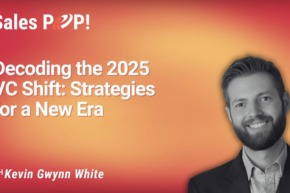Let’s be honest: “purpose-driven leadership” can feel like another empty phrase in the corporate lexicon, right up there with “synergy” and “thinking outside the box.” We see it on company posters and in mission statements, but the reality on the ground often tells a different story.
So, how do you move purpose from a marketing slogan to the very soul of your organization?
In a candid conversation with host John Golden, Ryan Estes, the co-founder of Kidcaster and Wildcast, pulled back the curtain on what it truly means to lead with intention. His approach isn’t about buzzwords; it’s about building a significant, authentic, and resilient company culture from the inside out.
This is not just another summary. This is a roadmap inspired by that masterclass. Whether you’re a founder mapping out your company’s future or a leader trying to reignite your team’s spark, these insights are your guide to building something that truly matters.
1. Start with Your Soul: The Inner Work of Purposeful Leadership
Before you can lead others with purpose, you have to find your own. For Ryan Estes, this isn’t a business exercise; it’s a spiritual one. His leadership philosophy is grounded in meditation and Buddhist principles, particularly the concept of “right livelihood”—the idea that our work should be meaningful, enjoyable, and cause no harm.
This isn’t about enforcing a specific belief system. It’s about creating an internal compass that guides your decisions.
- Actionable Step: Get quiet and ask yourself the hard questions. What truly makes your work feel meaningful? Is your professional life aligned with your core values, or are you just going through the motions? Integrating a practice—whether it’s meditation, journaling, or simply taking long walks to think—can bring stunning clarity to your leadership.
Leaders who operate from this place of deep personal alignment don’t just manage; they inspire. Their purpose is a lived experience, and that authenticity builds unwavering trust.
2. Culture Isn’t a Foosball Table; It’s a Conversation
The heart of Ryan’s company culture is one simple, non-negotiable trait: care. He argues that you can’t teach someone to care about others genuinely. It has to be a foundational quality in the people you bring on board.
This ethos transforms every interaction, turning transactional relationships into genuine connections. But how do you cultivate this in a fast-paced world?
- Actionable Step: Hire for empathy. Move beyond skills-based questions and ask behavioral ones that reveal how a candidate has demonstrated care in previous roles. Then, intentionally carve out space for honest dialogue. Estes points to an unlikely source of inspiration: the vibrant coffee shop and salon cultures of the past, where conversation was an art form. Creating a space for open, vulnerable, and in-depth dialogue is a radical act that fuels both innovation and resilience.
When a leader models vulnerability and listens deeply, they set the tone for an entire organization built on authentic connection, not just project deadlines.
3. Kindness Is a Strategy, Not a Soft Skill
Kindness in leadership isn’t about being “nice.” It’s a deliberate, daily practice. Ryan champions small, tangible acts—like writing a handwritten thank-you note—that make people feel seen and valued.
More importantly, this commitment to kindness shines brightest in the most challenging moments. Handling terminations or disciplinary actions with grace and dignity is the ultimate test of a compassionate leader.
- Actionable Step: Make kindness visible. Set reminders to acknowledge contributions. When delivering hard news, prioritize the individual’s dignity. Be transparent, empathetic, and supportive. At the same time, maintain a zero-tolerance policy for toxic behavior. How you handle disrespect sets the standard for everyone. Having experienced toxic leadership himself, Ryan is adamant that psychological safety is non-negotiable for high performance and retention.
4. Design Your Culture Before It Designs Itself
Too often, a company’s culture becomes an accidental byproduct of the founder’s personality. This is a considerable risk, especially as the company grows or leadership changes. The solution? Be an intentional architect of your culture from day one.
- Actionable Step: Define your core cultural elements. What makes your company feel like your company? Is it joy? Novelty? Transparency? Weave these concepts into your branding, rituals, and communication. And respect boundaries. Ryan cautions against the “we’re a family” trope, noting that family dynamics can be messy. Aim for a professional community built on mutual respect, where people can opt-in to social events without pressure. Be transparent about this culture—it will help you attract the right people and repel the wrong ones.
5. Authentic Values: Your Compass in a World of Noise
Are your company values just words on a wall, or are they the compass that guides every decision? Many companies fall into the trap of performative purpose—adopting values that sound good but have no real substance.
- Actionable Step: Co-create your values with your team. Host brainstorming sessions to uncover what truly resonates “in your bones.” The goal is to find principles that are broad enough to welcome diverse perspectives but focused enough to guide behavior. Avoid what Ryan calls “ideological capture,” where you let external trends dictate your mission. Your values are a living document; revisit them regularly to ensure they remain your true north.
6. Staying True: How to Scale Culture Without Losing Your Soul
Growth is exciting, but it’s also where culture breaks down. As new people join and complexity increases, how do you maintain that initial spark of purpose?
Ryan’s advice is born from experience: show grace and be transparent. When you make a mistake, like a bad hire, own it. Communicate openly with your team and involve them in the course correction. While collaboration is vital, a leader must also be decisive. The key is to always explain the ‘why’ behind your decisions to maintain trust. And never forget to celebrate the wins. As Ryan puts it, “give people their flowers” to foster motivation and loyalty.
7. The New Town Square: Why Your Voice on Podcasts Matters More Than Ever
The conversation took a fascinating turn toward the power of modern media, specifically podcasting. For leaders, this platform is no longer just a marketing tool; it’s a strategic imperative.
In the age of AI, search engines are increasingly scraping podcast transcripts to understand who you are and what you stand for. Your unscripted conversations on podcasts are shaping how AI, and by extension, the world sees your expertise and your brand.
- Actionable Step: Get in the game. Actively seek out guest spots on podcasts in your niche or consider starting your own. Use these appearances to refine your story and connect with new audiences. Embrace what makes podcasting so powerful: its “charming amateurism.” Listeners crave authenticity, not a polished corporate script. The process of articulating your ideas in real-time is also a powerful tool for self-reflection—it will sharpen your thinking and build your confidence as a leader.
Leading with purpose is a continuous practice, not a destination. It’s the daily commitment to aligning your inner values with your outward actions, creating a workplace where people don’t just work—they thrive.
Our Host
John is the Amazon bestselling author of Winning the Battle for Sales: Lessons on Closing Every Deal from the World’s Greatest Military Victories and Social Upheaval: How to Win at Social Selling. A globally acknowledged Sales & Marketing thought leader, speaker, and strategist, he has conducted over 1500 video interviews of thought leaders for Sales POP! online sales magazine & YouTube Channel and for audio podcast channels where Sales POP! is rated in the top 2% of most popular shows out of 3,320,580 podcasts globally, ranked by Listen Score. He is CSMO at Pipeliner CRM. In his spare time, John is an avid Martial Artist.






Comments